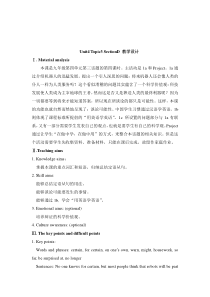 DOC
DOC
【文档说明】Unit 4 Topic 3《China is the third nation》(SectionD)教学设计-九年级上册英语【仁爱版】.doc,共(9)页,54.500 KB,由小喜鸽上传
转载请保留链接:https://www.ichengzhen.cn/view-104604.html
以下为本文档部分文字说明:
Unit4Topic3SectionD教学设计Ⅰ.Materialanalysis本课是九年级第四单元第三话题的第四课时。主活动是1a和Project。1a通过介绍机器人的迅猛发展,提出一个引人深思的问题:将来机器人还会像人类的仆人一样为人类服
务吗?这个看似滑稽的问题其实蕴含了一个科学价值观:科技发展使人类成为主宰地球的王者,然而这是否又是葬送人类的最终利器呢?因为一切都要等到将来才能知道答案,所以现在所谈论的都只是可能性。这样,本课的功能也就自然而然地呈现了:谈论可能性。中国学生习惯通过汉语学英语,1b则体现了课程标准所提
倡的“用英语学英语”。1c所设置的问题部分与1a有联系,又有一部分需要学生发表自己的观点,也就是要学生有自己的科学观。Project通过让学生“在做中学,在做中用”的方式,来整合本话题的相关知识。但是这个活动需要学生先收集资料、准备材料,只能在课后完成,故留作家庭作业。Ⅱ
.Teachingaims1.Knowledgeaims:掌握本课的重点词汇和短语,归纳总结定语从句。2.Skillaims:能够总结定语从句的用法。能够谈论可能要发生的事情。能够通过1b,学会“用英语学英语”。3.Emotionalaims:(optional)培
养辩证的科学价值观。4.Cultureawareness:(optional)Ⅲ.Thekeypointsanddifficultpoints1.Keypoints:Wordsandphrases:certain,forcertain,onone’sown,warn,might,hous
ework,sofar,besurprisedat,nolongerSentences:Nooneknowsforcertain,butmostpeoplethinkthatrobotswillbepartofourlives.Inafew
years,perhapsrobotswillthinkontheirown,justaspeopleusetheirbrainsandactforthemselves.Onescientistwarnsthatifrobotsstarttothinkforthe
mselves,theywillnolongerwanttobeourservants,butourmasters.Grammar:summarizetheattributiveclause,talkaboutpossibilities2.Dif
ficultpoints:Thescientistalsowarnsthatifwearelucky,theymighttreatusaswenowtreatourpets.Perhapstherewillbeawarbetweenh
umanbeingsandrobots.Inafewyears,perhapsrobotswillthinkontheirown,justaspeopleusetheirbrainsandactforthemselves.However,oncerobotscanthinkforth
emselves,problemsmayappear.Ⅳ.Learningstrategies在“语法和功能”部分,通过和老师同学一起总结定语从句的用法,来整理本话题的语法。通过讨论pre-reading的问题,预测文章的内容。在1b,尝试用英语释义来学习
英语单词。通过Project,在合作的过程中学习制作英语墙报。Ⅴ.Teachingaids各种机器人的图片/做墙报用的8开的纸/彩笔/一本英英词典/ppt等。Ⅵ.TeachingproceduresStage(t
imeperiod)InteractionpatternsTeacheractivityStudentactivityRemarks1Revision(8mins)ClassactivityEncouragetheSsreadoutt
heirHMKwhichwasassignedinSectionC.T:Hi,boysandgirls,happytoseeyouagain.Haveyoufinishedyourhomework?T:WhowouldliketoshareReadouttheirH
MKwhichwasassignedinSectionC.Ss:Yes.S1:Allright.这种幻想式的作文很有趣,可以让学生把他们的作品贴在教室的“英语园地”中。yourpassage?Howaboutyou,xxx?T:Wow!Whatwonderfulimagination!
Anotherone?OneDayWithoutComputersItwasthemostboringdayIspenttoday.Iwokeupateightinthemorning.ThenIwasreadytohavemybreakf
ast.Butthecomputercontrolledcookerdidn’twork.Isentamessagetomydriver—therobot.Buthedidn’tcome.SoIhadto
walktotheworkplace.WhenIgotthere,therewasabigcrowd.Thedoorcouldn’topenasusual.Theytoldmethatthecomputerwhichco
ntrolledthedoorwasbroken.Nobodycouldgointotheroom.ThenIwenttosupermarkettobuysomefood.It’sclosed,too.Thenotesaidthecomputerdidn’t
work.Idecidedtogohome.Isaid“OpenSesame”tothedoor.Oh,mygod!Itdidn’twork.Atlast,Ispentthewholedaywalkingalongthestreet!Untileightintheev
ening,everythingcamebacktolife.WhatabaddayIhad!S2:…S3:…2Gettingstudentsreadyforlearning(3mins)ClassactivityPresentallkindsofpicturesofrobotstogi
veabriefintroductiontorobots.T:Hi,class.Lookatthisstrangething.Whatdoyouthinkitis?T:No.It’snotatank.It’sarobot.It’sthefirstrobotintheworld.It
wasinventedbyEngelberger.Hewascalled“Thefatherofrobots”.T:Look!Therearemanypicturesofrobots.T:Youcanseerobotshavechange
dalotinshapes.Today,wewilllearnaboutrobots.Learnsomethingaboutrobots.S1:坦克。最好能够根据机器人的发展历程来展示各种机器人。3Pre-reading(5mins)GroupworkLettheSsdiscus
singroupsthequestionsin1atowarmup.T:Beforewebeginthenewlesson,I’dlikeyoutodiscussthequestionsin1afirst.Ifyoufinish,r
aiseyourhand.T:Whatareyouropinions,Group4?Discussingroupsthequestionsin1atowarmup.S1:Wealllikerobots.xxxsayshewouldlikearobottodohomeworkfor老师要适时讲
解部分生词。如:house+work=housework,serv(serve)+ant(„的人)=servant。T:Whatalazyboy!Totellthetruth,Ialsowantarobottodohouseworkfo
rme,haha!IfIhavearobot,itcandoallthehouseworkforme,likemyservant.Howaboutyou,Group1?T:Iagreewithyou.Ifyouwanttoknowmoreaboutrobots,justread1a.hi
m.S2:Welikerobots,too.Theyaretoohelpfulinourdailylife.S3:…S4:…4While-reading(5mins)IndividualworkLettheSsread1aanddo1b.Checktheanswers.
T:Next,youwillread1a.Butbeforereading,pleaseread1b.Youhavetofindthewordsinthepassageaccordingtothemeaning
sandthefirstletter.Whenyoufinish,putupyourhand.T:Hi,boysandgirls!Whocantelluswhatthefirstwordis?Howaboutyou,xxx?T:Itdoesn’tmatter.Pleasespellit.T:Ye
s,youareright.Followme,everyone.“warn”.T:Weusuallyuseitthisway:“warnsb.nottodosth.”or“sb.warnsthat…”Thesecondone?T:…Read1aa
nddo1b.Checktheanswers.S1:Sorry,Idon’tknowhowtopronounceit.S1:W-A-R-NSs:warnS2:causeS3:…S4:…尽管学生没学过“warn”,但通过英语解释,能知道第一个单词的意思是“警告”,然后再回到短文
去寻找哪个单词可能是这个意思。这就是要培养学生“用英语学英语”的能力。老师可以利用这个环节来让学生学习新词:warn,certain,servant。5Post-readStep1:LettheSsread1aRead1aag
ainand让学生在重ing(15mins)GroupworkIndividualworkagainandthendiscussthequestionsin1cingroups.T:Now,youwillr
ead1aagain.However,youshouldreadthequestionsin1cfirst.Afterreading,pleasediscussthequestionsingroups.Ifyoufini
shyourdiscussion,pleaseletmeknow.T:WhatareyouropinionsaboutQuestion1,Group3?T:Great!Eachgrouphasdifferentideas.Robotsareco
nsideredtobeourservants,aren’tthey?T:Ihopeso.Doyouthinkrobotscanthinkoractforthemselves?T:Itseemsthatyouhaveadeepdiscussion.Howaboutthelastquesti
on?T:Iagreewithyou.Thepassageisjusttalkingaboutthendiscussthequestionsin1cingroups.S1:Wethinkrobotswillbepartofourli
vesinthefuture.Becausecomputerscienceandrobottechnologywillmakeeverythingpossible.S2:Wethinkrobotswillplayimportantparti
nmanyareasofwork,especiallyinfactories.S3:Wethinkrobotswillbepartofourlives,buttheywon’ttaketheplaceofhumanbeings.S4:…S5:…S6:Wethinkt
heyare.S7:Wedon’tthinkso.Theyaremachinesonly.Theydon’thavetheirownbrains.S8:Perhapsitispossible.Human读1a之前,先读1c的问题,带着问题去阅读,有利于提高学生的阅读效率。老师要在学生回答
第4个问题时,顺势点明:文章possibilities.Doyouknowwhichwordsareusuallyusedtotalkaboutpossibilities?T:“May”and“Might”.
Step2:LettheSsread1athethirdtimetofindouttheusefulexpressionsandthesentenceswhichexpresspossibilities.T:Youhavelearnedhowtotalkaboutpossibilitie
s.Now,read1athethirdtimetofindoutthesentenceswhichexpresspossibilitiesandusefulexpressions.Ifyoufinish,p
utupyourhand.T:Now,let’scheckthesentencestogether.Thefirstoneis…T:Thesecondoneis…T:…T:Thoughthepassageisjusttalkingaboutpossibilities,from
thispassage,weknowsciencemaybenotalwaysgoodforus.Perhapsitwilldoharmtohumanbeingsinthefuture.T:Haveyoufoundanyusefulexpressions?beingsaretooclever.T
heycanmakeimpossiblethingspossible.S9:Becauserobotsmaybecomemastersofthehumanbeings.S10:Becausewearenotsure,i
tisaquestion.S10:Perhaps,probablyS11:maybeRead1athethirdtimetofindouttheusefulexpressionsandthesentenceswhichexpresspossibil
ities.Ss:Perhapsrobotswillthinkontheirown,…Ss:However,oncerobots…mayappear.Ss:…所讲的只是可能性。并指出本话题的目的之一就是要谈论可能性。通常用这些词来表达可能性
:perhaps,probably,maybe,may,might。S1:forcertain,sofar,..S2:besurprisedat,onone’sown,…S3:nolonger,between…and…6Summarizingandassigninghomework(9mins)
ClassactivityClassactivityStep1:LettheSsreadthesentencesinGrammarandFunctionstogether.T:Wehavefinishedthistopic.It
’stimetosumup.First,readthesentencesinGrammarandFunctionstogether.Ready?Go!Step2:LettheSssumupthegrammar.T:Now,let’ssumupthegrammarandex
pressions.What’sthegrammarforthistopic?T:Yes.Whatelse?T:Right.xxx,canyousaysomethingaboutattributive
clause?T:Soundsgreat!Whowantstoaddmore?T:Welldone.Howaboutpossibilities?T:Howwonderful!Step3:HMKT:Iknowyouaregoodatmakingwallnewsp
apers.ButI’mnotsurewhetherReadthesentencesinGrammarandFunctionstogether.Ss:…Sumupthegrammar.Ss:定语从句。S
1:还有谈论可能性。S2:定语从句常用的关系代词有:who,which,that.Who用于指人,which用于指物,that既可以指人,也可以指物。S3:从句中的谓语动词要和先行词的数保持一致。S4:常用ma
ybe,may,might,perhaps,probably来谈论可能性。学生喜欢竞争,渴望得到认可。所以老师要强调:墙报做得好的小组将得到礼物。其余也要张贴到“英语角”,这样每个小组都youaregoodatmakingEnglishwallnewspapers,too.Today,y
ou’llhavethechancetoshowyourtalent.Afterclass,pleaseworkingroupstomakeanEnglishwallnewspaperaccordingtotherequirementsinProject.Wewillcho
osethebestoneandgivethisgrouppresents.AllyournewspaperswillbeputupontheEnglishCorner.会认真对待这个任务。Ⅶ.BlackboarddesignChinaisthethirdnationth
atsentapersonintospace.SectionDWordsandphrases:certainforcertainonone’sownwarnmight(may)house+work=houseworkGrammar:attri
butiveclause:定语从句relativepronouns:关系代词antecedents:先行词当先行词指人时,关系代词用“who/that”;当先行词指物体时,关系代词用“which/that”。关系代词在从句中的成分:主语,宾语关
系代词的省略:在从句中作宾语时Possibilities:maymightperhapsprobablymaybeSentences:Thescientistalsowarnsthatifwearelucky,theymighttreatusaswenowtreatourpets.Perh
apstherewillbeawarbetweenhumanbeingsandrobots.Inafewyears,perhapsrobotswillthinkontheirown,justaspeopleusetheirbrai
nsandactforthemselves.However,oncerobotscanthinkforthemselves,problemsmayappear.
 辽公网安备 21102102000191号
辽公网安备 21102102000191号
 营业执照
营业执照